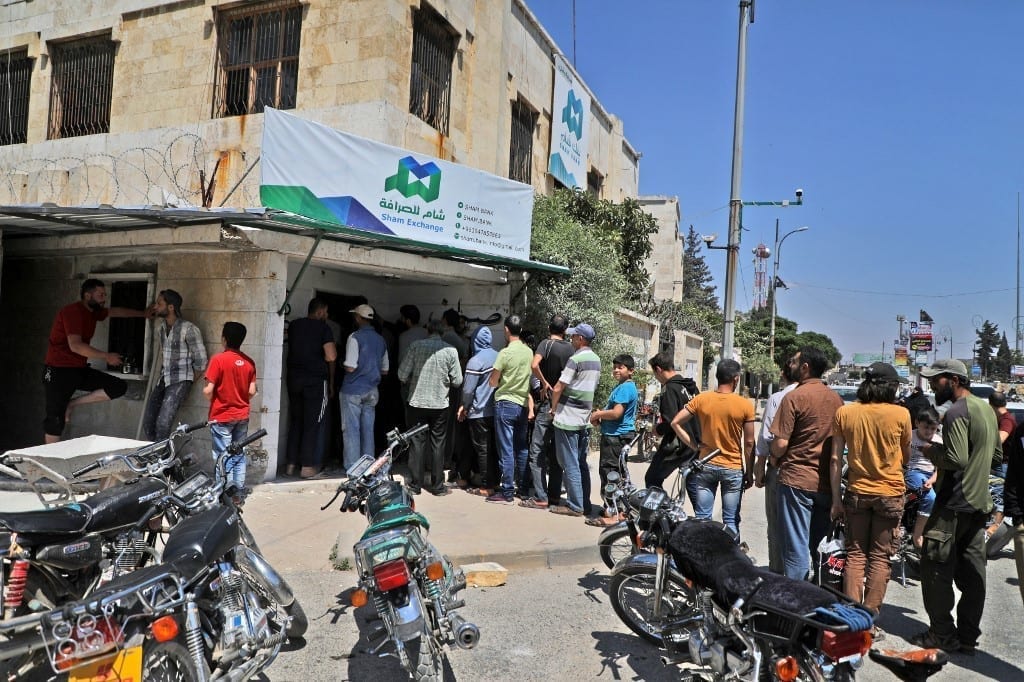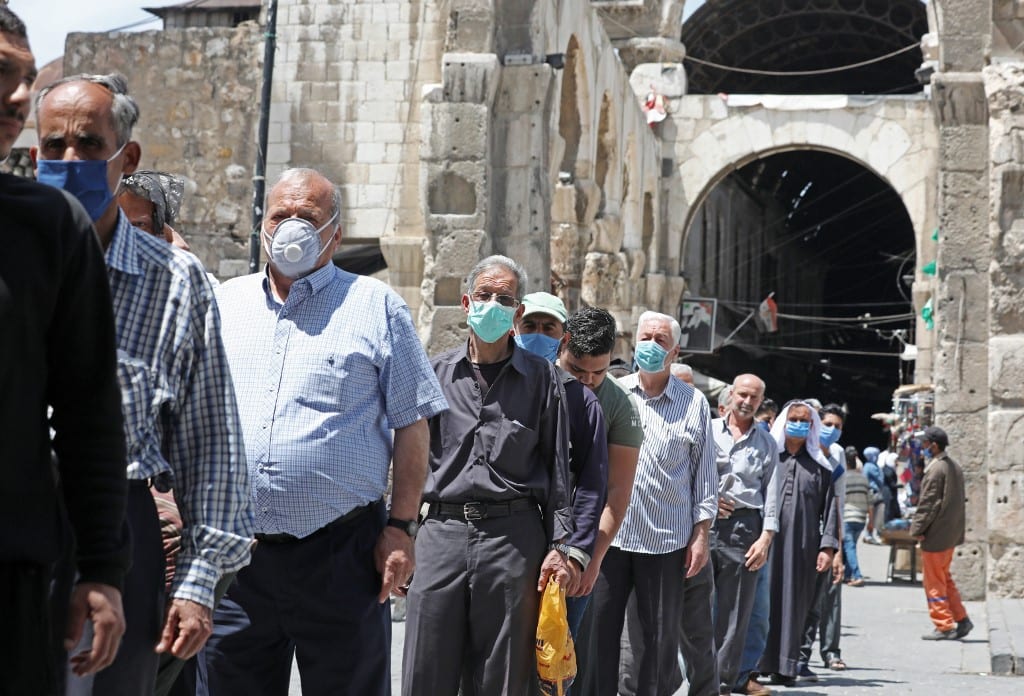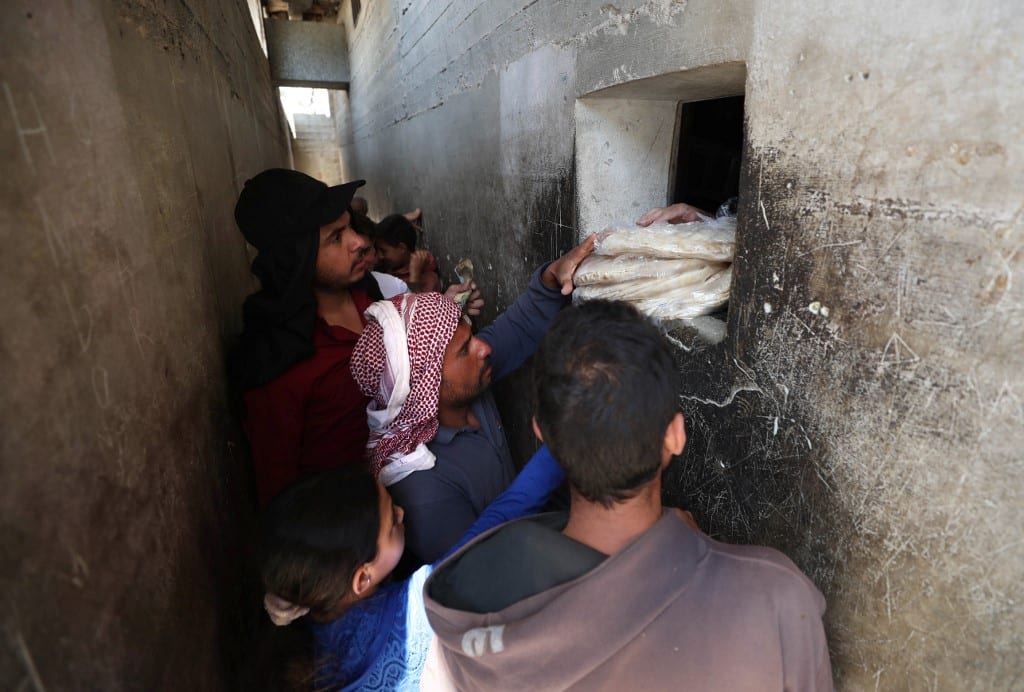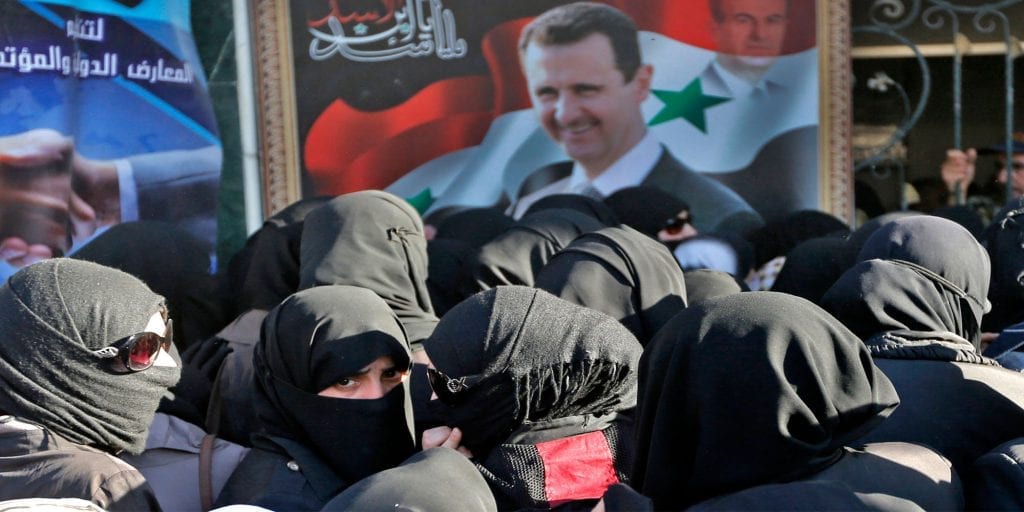If there is something the Syrians will not forgive, it would definitely be waiting. Waiting in the Syrian context extends from an hour to many hours, waiting for electricity to come back on, winter fuel, gas cylinders, a loaf of bread, a kilo of sugar, a kilo of rice, aid boxes, etc. Syrians ultimately have lots of things to wait for, day after day, and now a complex relationship has formed between them and the notion of waiting. This relationship has branched out and taken a clear and visible shape that you can see from a distance, and is easily distinguishable from its loud voices. Some people call it a queue, and others suggest that it is a herd mentality which they are forced to follow, shaping thoughts and desires gradually. Thus, waiting in a queue becomes a kind of daily culture which helps people forget their real life, and indulge in the search for the most basic of their living rights.
This is how peoples are domesticated, and how competences, talents and abilities are suffocated underneath a long line of dreams, fears and needs.

How Did the Queue Arise and Where Does it End?
Umm-Ahmad spoke to a woman standing behind her in the queue, saying: “I am going to have rest for a while and then come back, so please do not let anyone take my turn”. Then, she repeats the same words to the woman in front of her. Umm-Ahmad’s house is not away from Al- Mu’tamad where she awaits to receive her gas cylinders. After a long time of waiting, the gas cylinder truck was late and Umm-Ahmad’s feet started to hurt, so, she decided to head home to rest. Usually, if she trusts the woman standing in front of her or behind her, she gives them her landline telephone number and asks them to call her if the gas cylinder truck arrives while she is at home. This way, she will know when the car arrives and then immediately run back to the queue.
The queue is a line of more than ten persons, and may reach hundreds of people, who share the same desire of getting their turn over with as quickly as possible to reach their goal, which is often acquiring one of the most basic needs such as bread or fuel, or of course a document or a signature of an employee in the official departments or students enrollment centers at universities. The queue may also take up the shape of cars, lining up and waiting to fill up on fuel or simply taking a long time in front of one of the checkpoints. The turn may end in an hour, or if your luck is unfortunate, it will end within hours. Some people in queues organize themselves, so the women queue up in a separate line from men. Other queues are never organized, so people start scrambling and whoever is harboring the most physical strength amongst the bunch is the one who reaches to the end of the line and receives his ration the quickest.
One of the queues at the gas stations stretched along the main street then turned right and stretched along my house to the end of the alley. Back then, I woke up and I was afraid of the sound of rolling gas cylinders which sounded so close to me. For days, I watched, from the peephole, the queues which started at one point but almost never ended. Most of those who waited for their turn were elderly people; their children were most probably at work, so they had to to handle this exhausting task themselves. Others were exchanging waiting turns; an older brother would go home to have lunch and take a nap, then to return after an hour and a half to take his younger brother’s turn in the queue which was still going. I engaged with them in some of their conversations and quarrels, when somebody encroached upon another’s turn. These quarrels end horribly in most cases, because sometimes the problem would arise that the number of gas cylinders may come to an end in the middle of the queue, so imagine witnessing the person whose turn was supposed to be after yours, taking your turn and acquiring the last one!


The “Sandwich” of the Queue
Picture a scene in which an old lady at first pulls at an empty stroller, but then walks away hours later with a stroller in which a full gas cylinder is lying, pulled by her with incredible difficulty. If you have not seen this kind of scene before, you do not know the true meaning of happiness, when it takes the form of deep misery; a feeling which extends to narrate to everybody in the street the story about that pulled gas cylinder.
Men cannot do without their cigarette packets; there is nothing else to help them be patient during their wait in a long line that seems to stretch forever. This matter is again not free of quarrels only amongst men, but women in such situations become more courageous in defending their spots, like the woman whose turn a man tried to take, as she drags the empty gas cylinder in one hand and pushes him with the other. She then wraps her shawl around her neck again and continues to push the man away. In these queues, women have learned to defend their places with all their power, because of the gravity of the matter. If you leave the place you got, you will lose it entirely.
If the waiting time is long, especially in the scorching summer sun, those in the queues make sure to bring water bottles with them from their homes, and may also take some thyme sandwiches with them. Umm-Ayham explains: “I always share (my sandwich) with the woman standing in front of me and the woman behind me, as they are often my neighbors. We agree to go together.” She added, “Waiting with people you know makes it a bit easier”.
What if waiting was both profitable and empty at the same time? What if it was both a victory but also a defeat? That woman, whose story was spread everywhere, did not want anything but to acquire a gas cylinder. That woman, who was around 80 years old, stood alongside the road to catch her breath, unable to carry the gas cylinder. A taxi arrived and the driver offered her a ride, and he put the gas cylinder in the car trunk. When she arrived in front of her house and asked her son to carry the cylinder, it was very light, as if the gas inside it had evaporated or disappeared. Indeed, the gas had not disappeared, but the driver had replaced her cylinder with an empty one. That is the story of how, on that day, the old woman lost the gas cylinder, its price, the taxi fare and hours of useless waiting. On the other hand, the triumphant taxi driver returned home to his family without exerting any effort at all, besides the deception of old woman!


An Unsuccessful Maneuver
On the family register, we would leave a mark agreed upon by the team during the distribution in a humanitarian organization, in areas where the displaced people live. On that day, we were distributing winter clothes for children, and and because of their large number relative to the limited number of clothes, we would put that star at the corner of the family register. Organizing the lines was almost impossible; huge numbers, miserable faces and barefooted children, at the end of the register there were more stars than you expected! But some of the desperate families would want to get more of everything, and come back to take another share of clothes, but the star would expose them.Each time I had to tell the team that this person had already received his share, I would experience a bunch of incredibly ugly and complex emotions. The beneficiary would strongly deny it, which would only add to my pain, but the star drawn on the side of the register would reveal the truth, the star I drew!
The Syrian, on every long queue, has to try to alleviate the boredom of the wait. At night, for example, people would line up in front of the distribution center, with coffee or tea thermos flasks, sitting on the floor. No matter how early people would come, midnight is always the best time; So some would wait from midnight until 8 or 9 am, but the rewards were great, receiving the first gas cylinder!
Women are sexually and verbally harassed while waiting in queues, especially when the lines are unorganized, and those waiting are not divided into the two gendered queues, one for men and another for women. Hands extend amid the crowds, while the women hide their anger. Who will hear them amidst this hungry crowd?
On the other hand, relatives working in distribution centers or in bakeries represent a real treasure, so getting family benefits becomes a simple, effortless task that does not require waiting or waking up early, as the family’s share of sugar is put aside before distribution starts. “I will put your share aside and I will not stamp your card, so you can receive your share twice within one month,” says one of the distribution workers to her relative.
Relations have played a key role in changing the lives of Syrians, and those without “patronage” or an intermediary will have to bear the waiting and losing.
Sometimes even the gas-cylinder truck’s arrival in itself is a rumor that someone makes up, and so many people would believe until the line-up would reach tens of meters. At 11 a.m., they leave with their empty cylinders, but the most disappointed of them all would be those who would have been waiting since midnight in the street. You would hear one of them screaming: “Rascals! It was a lie! They made me wait all night for nothing!”
Are We Humans When We Stand in Queues?
My friend says: “Everyone stands in queues. Haven’t you seen the queues waiting to buy the new phone in front of Apple stores or the crowds waiting on Black Friday?” But the Syrian queues cannot be compared to those; the difference is that there, you stand voluntarily waiting, whether it is organized and civilized or not, the importance characteristic is that it is a voluntary matter, something you want to do to satisfy a need. In the Syrian case you are forced to stand, and you are in desperate need for a share of rice that you cannot possibly afford to buy elsewhere for double the price, or fuel for fear of the coldness of winter on your children. You will learn, slowly, that utilizing cruelty and stubbornness in not giving up your place, is the only way to get your right.
My friend interrupts me: “But isn’t it all a culture of queuing in the end?! One way to focus on the need for something, whether it’s an iPhone or a kilo of rice!” Elsewhere, words are just words, the truth is bitter, and waiting is tough and cruel. A seventy-year-old man exclaims hopelessly, after more than three hours of waiting: “I feel like I will die before it’s my turn!”
“I have a health condition,” says Mariam -a pseudonym-, “I may suffer a sudden loss of consciousness and a drop in blood pressure, when I’m in a crowded place with inhumane conditions, such as the Syrian waiting queues.”
This happened once on an internal transportation bus, amid congestion, sticky bodies and the smell of sweat, Mariam fell unconscious and woke up to find all the bus passengers around her, with every bottle of water emptied over her head. “I remember when I was in college, the same thing happened, when students were waiting in line, for the late employee in front of a small window, fighting and pushing each other. Losing consciousness that time was useful, as students felt I was unable to take part in the ongoing pushing and insults, so they let me have their turn, and said to the employee, “Finish the dizzy girl’s papers first!”
On the other hand, one scene of the “Syria for Trade” trucks distributing rations through the smart card summarizes the idea of destroying the simplest conditions of human dignity, as a man stands enduring humiliation and bearing insults. He should receive his ration amid this crowd that may last hours, people fighting to reach the truck door. An angry man shouts at the worker who yelled at him to stand in line and stop pushing others, saying “Am I the only one who should stand in the line like a fool?”


Women are the Victims of Queues
Women are sexually and verbally harassed while waiting in queues, especially when the lines are unorganized, and those waiting are not divided into the two gendered queues, one for men and another for women. Hands extend amid the crowds, while the women hide their anger. Who will hear them amidst this hungry crowd? Some of them leave the queues, others revolt. Many in the neighborhood mentioned hearing the voice of an angry woman shouting: “You’re hungry and waiting since early morning, yet you’re still in the mood to touch me!”
The crowd went silent and people could almost hear their breath. Nothing else happened that day, the man went back to the end of the line, someone said, while the woman kept her place, with the painful memory of a mark on her body, which only she could feel.
After many women lost their husbands in the past few years, families were deprived of the sole source of income, thus women had to perform difficult tasks. They had to enter a daily and direct confrontation with the world of men, which were not used to have women so close. In addition to the hunger and the war, many want the women to be victims of physical and verbal harassment in the queues.
Harassment may come from the distributors themselves and those responsible for the distribution of rations in associations and organizations, where women may be blackmailed for their share or for a larger share, in exchange for sexual services later on. Some women concede and leave their phone numbers, and some distributors know in advance where their homes are located. “Once the person responsible for charitable distributions told me he wouldn’t give me my ration if I didn’t give him my number,” Kawthar tells me, “I gave him a wrong number, took my ration, and never returned. Now I go to a further place to receive my ration.” When asked if she tried to file a complaint, she said, “Do you really think we know to whom we should go? The only face we know is this distributor, and I am afraid of losing my ration if I complain.”
Some call it a queue and others say it is the herd mentality we are forced into, where our thinking and desires are gradually shaped, and the queue becomes a kind of a daily culture, which makes people forget their real lives and engage in the search for their most basic living rights. How do people develop or think about going out of their misery when they spend half a day in line, and the other half thinking and asking when they are going to receive their rations, or resting after the fatigue from the long wait? This is how people are domesticated, and their skills, talents, and abilities are killed amid a long line of dreams, fears, and needs.






